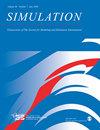Low-latency GNSS multipath simulation and building wall detection in urban environments
IF 2
4区 工程技术
Q4 COMPUTER SCIENCE, INTERDISCIPLINARY APPLICATIONS
Simulation-Transactions of the Society for Modeling and Simulation International
Pub Date : 2023-01-20
DOI:10.1177/00375497221145601
引用次数: 0
Abstract
Precise navigation for fully autonomous driving—especially in dense urban areas—requires periodic precise position estimates. Global Navigation Satellite System (GNSS) technology has the potential to provide absolute positioning accuracy at a centimeter level. However, buildings in urban environments cause signal distortions and signal reflections—the so-called multipath—which are the most challenging parts in the GNSS error budget. Hence, we developed a scalable real-time multipath simulator for mitigating potential multipath receptions. The simulator uses three-dimensional (3D) building information, satellite, and user positions. The key drivers of latency are the calculation of reflection, diffraction, and line-of-sight, as well as the response time of the 3D building model database. The memory manager of the graphic processing units (GPUs) in combination with a dedicated load balancer enables fast and efficient multipath analysis. Selected case studies demonstrate the simulator’s potential to significantly improve the position accuracy of the processing engine. The use of the multipath simulator reduces the error in 61% of the error measurements in a stress test scenario to less than half of the non-multipath processing. The scalability of the simulator is demonstrated by combining the multipath simulator with a traffic simulator. Furthermore, we present a novel methodology for the detection of walls using GNSS signals to better account for incomplete or erroneous 3D building information in GNSS signal processing.城市环境下低延迟GNSS多径仿真与建筑墙体检测
完全自动驾驶的精确导航——尤其是在人口密集的城市地区——需要定期进行精确的位置估计。全球导航卫星系统(GNSS)技术有可能提供厘米级的绝对定位精度。然而,城市环境中的建筑物会导致信号失真和信号反射,即所谓的多路径,这是GNSS误差预算中最具挑战性的部分。因此,我们开发了一个可扩展的实时多路径模拟器,以减轻潜在的多路径接收。模拟器使用三维(3D)建筑信息、卫星和用户位置。延迟的关键驱动因素是反射、衍射和视线的计算,以及3D建筑模型数据库的响应时间。图形处理单元(gpu)的内存管理器与专用负载平衡器相结合,可实现快速高效的多路径分析。选定的案例研究表明,模拟器的潜力,以显着提高处理引擎的位置精度。多路径模拟器的使用将压力测试场景中61%的误差测量中的误差减少到不到非多路径处理的一半。通过将多路径模拟器与流量模拟器相结合,验证了该模拟器的可扩展性。此外,我们提出了一种使用GNSS信号检测墙壁的新方法,以更好地解释GNSS信号处理中不完整或错误的3D建筑信息。
本文章由计算机程序翻译,如有差异,请以英文原文为准。
求助全文
约1分钟内获得全文
求助全文
来源期刊
CiteScore
3.50
自引率
31.20%
发文量
60
审稿时长
3 months
期刊介绍:
SIMULATION is a peer-reviewed journal, which covers subjects including the modelling and simulation of: computer networking and communications, high performance computers, real-time systems, mobile and intelligent agents, simulation software, and language design, system engineering and design, aerospace, traffic systems, microelectronics, robotics, mechatronics, and air traffic and chemistry, physics, biology, medicine, biomedicine, sociology, and cognition.

 求助内容:
求助内容: 应助结果提醒方式:
应助结果提醒方式:


